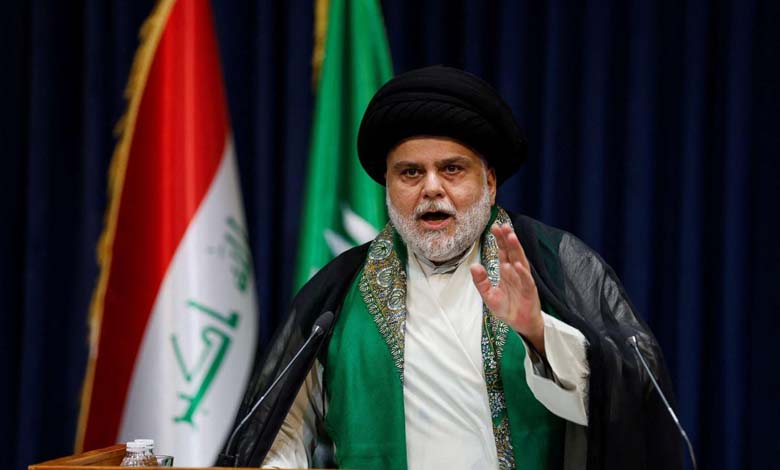Al-Sadr and Al-Sistani… a meeting reshuffles the cards ahead of Iraq’s parliamentary elections

A meeting in Najaf between the leader of the National Shiite Movement (formerly the Sadrist Movement), Moqtada al-Sadr, and the supreme cleric Ayatollah Ali al-Sistani has redrawn the balance within Iraq’s Shiite political scene.
According to Iraqi political sources, the encounter signals Iraq’s entry into a highly sensitive political phase just weeks before the parliamentary elections scheduled for November, amid fears of a resurgence of popular protests under the banner of the Sadrist Movement or independent civil forces emerging from the October uprising.
-
Al-Sadr hints at possible shift from election boycott
-
Political Corruption Decides al-Sadr’s Decision to Boycott Elections
Preparations for large-scale demonstrations
Sources within the Sadrist Movement said that Moqtada al-Sadr informed Ayatollah al-Sistani during the meeting of arrangements for massive demonstrations by his supporters on October 25, to protest the parliamentary elections planned for November 11.
The sources added that Sadr is seeking prior coordination with religious centers in Najaf and tribal councils to ensure that his supporters’ mobilization remains peaceful and disciplined, focusing on rejecting what he described as “political irregularities” tainting the electoral process, stressing that the movement’s participation would not occur “through ballot boxes shrouded in suspicion.”
According to exclusive information, meetings have already been held in densely populated areas considered Sadrist strongholds, including Tamimiya, Rabit, Hayaniya, and Ashar, in addition to parts of northern Basra, where coordinated protests are being prepared with slogans denouncing government performance and the upcoming elections.
-
Al-Sadr Disowns Candidates Defying Election Boycott Decision
-
Al-Sadr Calls on Government to Punish Those Intervening in Syria
Political messages to the clerical authority
The same source added that Sadr told al-Sistani that these demonstrations would represent “a popular stance” rejecting candidates seen as seeking to “strengthen corruption or weaken the clerical authority and the sect,” stressing that he asked al-Sistani “to issue a fatwa or guidance if deemed necessary in the public interest.”
Although al-Sistani’s office has not issued any official comment on the meeting, observers note that this move recalls the Sadrist Movement’s history of protest mobilization, raising questions about the next stage and the possibility of heightened political confrontation between the movement and state forces.
-
Al-Sadr Prevents Random Displays of Peace Brigades, Fearful of Infiltration
-
The mystery surrounding Muqtada al-Sadr’s position on the Iraqi local elections is prompting Nouri al-Maliki to test him
At the same time, the absence of electoral posters in Sadrist strongholds, particularly in Baghdad’s Sadr City and Shaoula, signals supporters’ refusal to engage in the elections.
While al-Sadr’s office has not released an official statement about the meeting, sources close to the clerical authority indicated that discussions covered the current political situation, the movement’s stance on the upcoming elections, and the potential protests being organized in the south and in the capital.
-
Al-Sadr return to politics through the gateway of provincial council elections
-
A new religious group in Iraq stirs controversy and threatens al-Sadr… The full story
Sharp stance on the Sharm el-Sheikh summit
Following Prime Minister Mohammed Shia al-Sudani’s participation in the “Peace Summit” hosted in Sharm el-Sheikh, al-Sadr launched harsh criticism against the ruling Shiite parties, describing Iraq’s presence at the summit as “a disgrace,” and deeming it “a prelude to normalization or an implicit recognition of the two-state solution,” which is prohibited under Iraqi law.
In a post on X, al-Sadr wrote: “O Lord, I disavow this act in advance,” signaling his categorical rejection of any political path leading to rapprochement with Israel or acceptance of the U.S. settlement project in the Middle East.
Previously, al-Sadr had ordered the boycott of 78 candidates affiliated with his movement who participated in parliamentary elections under Shiite political lists, accusing them of “seeking to weaken the honorable sect, oppose the reform project, and strengthen corruption.”
-
Al-Sadr’s use of the term Arabian Gulf provokes Iranian anger
-
Al-Sadr rejects his movement’s participation in the new Iraqi government
Al-Sudani defends participation
For its part, the Iraqi government defended al-Sudani’s participation in the Sharm el-Sheikh summit, which brought together more than thirty countries under the leadership of U.S. President Donald Trump and Egyptian President Abdel Fattah al-Sisi, with the aim of announcing a peace plan to end the war in Gaza.
Government spokesman Basem al-Awadi said on state television that Iraq’s presence “confirms its central role in the Middle East,” noting that al-Sudani sought “to be at the heart of international deliberations” in order to gain direct insight into agreements shaping the future of the Palestinian issue.
Al-Awadi reaffirmed Baghdad’s “firm” position in supporting the Palestinian people, clarifying that the summit aimed “to stop the fighting and rebuild Gaza,” and did not involve any bilateral or political agreement undermining Iraqi principles.
-
Al-Sadr Seeks to Regain Religious Legitimacy Undermined by Al-Haeri’s Retirement
-
Al-Sadr sends a message of multiple contents to the Iranians; What is it?
Internal division over participation
Hassan Ali al-Daraji, a candidate from the Reconstruction and Development Coalition led by al-Sudani, stated that “al-Sudani’s handshake with President Trump does not represent normalization,” explaining that “every Iraqi prime minister since 2006 has met with their American counterparts, which does not imply acceptance of Washington’s policies or abandonment of national constants.”
Analysts believe that al-Sadr’s visit to al-Sistani could pave the way for a revival of popular mobilization framed within religious and political boundaries, particularly amid growing public anger over economic conditions and recurring accusations of corruption and weak governance.












